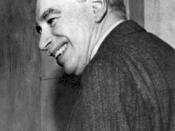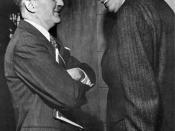Writer Surname � PAGE �1�
[Writer's Name]
[Institution Name]
[Supervisor Name]
[Date]
Alfred Marshall Contribution To Economics
Introduction
Few economists continue information in any but their slender localities of specialization. A handful of expert economists, although, have amply amplified the frontiers of financial science. Their titles and concepts are dispersed over history. Adam Smith, David Ricardo, John Maynard Keynes, and, in our own time, Paul Samuelson and Milton Friedman, have enclosed the gamut of financial theory. Alfred Marshall (1842-1924) pertains in this elite group. Born in a middle-class London suburb, Marshall was destined for the ministry, as asserted by his stern, evangelical father. An unaligned sort, he turned down a classics scholarship at Oxford and rather than investigated numbers at Cambridge. Marshall's exposure to beliefs directed to a lifelong anxiety with scarcity and other communal difficulties that inundated developed England and, in turn, to the study of economics, in which he excelled.
His most well renowned scholar, John Maynard Keynes, recounted Marshall as the utmost economist of the nineteenth century.
Discussion
Many concepts conveyed in Marshall's Principles of Economics (1890) had been evolved much previous, but his endurance and diligence paid lasting dividends. Despite improvement in idea since his death, large components of economics stay distinctly Marshallian. His foremost assistance encompass the notions of comparable equilibria, cost elasticity of demand, interior and external finances of scale, expanding and declining cost commerce, quasi-rent, and buyer surplus. Before Marshall, a hodgepodge of ideas strove against in interpreting charge and value.
An English custom had perfected John Locke's work idea of worth into the concept that worth counts only on supply-the charges of the work, capital, and land soaked up to make a good. However, the Austrian economists Carl Menger (1840-1921) and Eugen von Bohm-Bawerk (1851-1914) had evolved a personal, demand-oriented...


